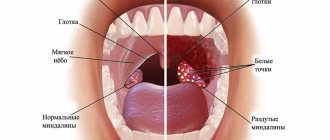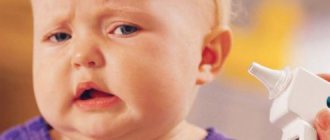Coughing in a child is not a harmless symptom.
Coughing is a protective mechanism that is necessary to cleanse the airways of pathological secretions. With the help of rare cough shocks, accumulations of mucus are removed from the bronchi, trachea and larynx.
But if a child develops a persistent cough, what should parents do to help cope with the unpleasant symptom? First, you need to see a doctor who will determine the cause of the cough, and then prescribe a course of effective treatment.
Why does my baby cough?
It should immediately be noted that if a newborn coughs, this may be the body’s natural response to excessive salivation. This pathology is also observed during meals in a child; he coughs at the moment of swallowing food.
This indicates that the swallowing reflex is not yet sufficiently developed. If a newborn coughs and the child does not have a fever, then such a pathology should not frighten parents too much. The cough will go away over time. If your baby coughs too often or the cough has become a cough, you should definitely visit a doctor. If an older child coughs, the doctor will tell you what to do. Only a specialist will be able to identify the root cause of the pathology. This symptom does not always require therapeutic treatment. The main provoking factors are:
- psychological factor;
- physiological features of the child’s body;
- rhinitis;
- allergic reaction;
- teething.
What influences the diagnosis? In children, from the physiological side, the flow of secretions and mucus from the olfactory organ, and saliva along the back wall of the nasopharynx, is predetermined. For this reason, mucus accumulates and can only be removed by coughing. If a child coughs in the morning, it is necessary to check for a runny nose.
When teeth appear, the baby’s salivation increases, which becomes the root cause of the disease. If such a symptom is observed at night, then the doctor will answer the question of why the child is coughing. Typically, pathology occurs due to an allergic reaction or concentration of mucus in the bronchi. It is important not to delay and consult a doctor. The short-term expression of such a symptom may be associated with the physiological structure of the ligaments, soft palate, or inflammation of the adenoids. They mechanically affect breathing, making it difficult. If your baby coughs for a long time, this may be due to parasites in the body. Most often, the root cause is worms. Therefore, it is mandatory to undergo tests.
How to treat a child's cough without fever
You need to start only when the pediatrician examines and makes a diagnosis. You should not prescribe medications to a small child yourself. The number of drugs should be kept to a minimum; treatment is more based on proper care.
If the cough is dry without fever, then maybe we are talking about an allergy. In such a case, you need to determine what causes such a reaction in the baby. Perhaps these are flowers, perfumes, household chemicals.
Of course, a wet cough with wheezing is noticeably better than a dry one. It is already productive, which means there is mucus in the lungs that needs to be coughed up. Breasts should not be given too many medications that thin out mucus. The child's lungs are not yet fully developed and he may choke on mucus when he starts coughing. You need to treat wisely and with great care.
Basically, this symptom is characteristic of ARVI. The child may have a fever, runny nose, weakness, or headache.
Treatment comes down to creating the right regimen; the body itself will cope with the virus. Medicines are needed for fever to alleviate the baby’s condition. And it needs to be knocked down when coughing because when the body burns, the blood and mucus become thicker. And it is much more difficult for the baby to cough up thick mucus.
Methods to alleviate the condition in a child:
- Don't overfeed. A baby can be fed only if he asks for it.
- Maintain water balance. The baby should drink a lot of warm juice, tea, compote. Even if there is no fever, warm liquid still helps to thin the mucus.
- Use antipyretics as needed.
- The room is thoroughly ventilated; an air humidifier is necessary. Moreover, it greatly makes you feel better when you cough.
- If there is no temperature, then you need to walk outside with your child.
- Medicines are used in minimal quantities and doses.
- When the cough is dry, it needs to be moistened. If it is wet, then they give expectorants. For an infant, they are used in small quantities so that he does not choke on mucus.
Of course, a wet cough is preferable to a dry one. This is already the first step towards recovery. But you can’t let it take its course, otherwise there is a high risk of developing pneumonia. In young children, this complication occurs very quickly compared to adults. This is why it is so important to see a doctor on time.
Itchy feeling and dry cough
With a dry cough, the throat feels sore, but there is no noticeable sputum production. This pathology characterizes the initial stage of many respiratory diseases:
- laryngitis;
- tracheitis;
- bronchitis.
When the baby is sick for several days, sputum production begins. A severe cough can be the root cause of microbial infections:
- diphtheria;
- tuberculosis;
- whooping cough.
Various allergens can also provoke such a cough:
- pollen;
- animal hair;
- feathers in pillows;
- dust.
In the case of an allergic reaction, additional symptoms such as lacrimation and rhinitis are observed. An equally important cause of dry coughing is insufficiently humid air or excessive dust. The root cause is also chemicals:
- dye;
- perfumery;
- detergents;
- tobacco smoke.
Sudden coughing indicates penetration of a foreign object into the respiratory tract.
Prevention
It is necessary to create the right conditions for the life of a little man. First of all you need to:
- Take a walk every day. For any weather.
- You need to relax in the village, away from cars and roads.
- Timely vaccination is mandatory.
- The room where the baby lives needs to be regularly ventilated and moistened.
- If the cough is allergic, then it is important to eliminate the cause.
- Complementary foods are introduced no earlier than six months.
- Breastfeeding is preferable because it gives the baby immunity from the mother.
- For any health problems, it is important to consult a doctor.
These simple rules of care will help protect your baby from most diseases, especially ARVI.
Coughing without fever
Most viral illnesses are accompanied by not only a cough, but also a rapid rise in temperature. The first thing that can cause it is the penetration of a foreign object into the respiratory tract. It must be eliminated urgently, otherwise the baby may suffocate. Do it yourself or call an ambulance. Incompetent treatment of tonsillitis, bronchitis, and tracheitis leads to their chronic course. The acute inflammatory process is sluggish, and coughing is observed without fever. In the case of bronchial asthma, an increase in temperature is not always observed. The baby experiences attacks of suffocation. Such a cough, unaccompanied by other manifestations, indicates inflammation of the adenoids.
Treating a child's cough
In addition to using warm drinks, you can use some medications. All cough medicines are divided into two types:
- Stopping an attack. It contains codeine, which is currently only available by prescription. Only a doctor can prescribe such drugs if he considers it reasonable.
- Thinners and expectorants. There are a lot of them. Before use, you must read the instructions. Some medications are herbal (Prospan), and some are based on artificial substances (Flavamed, Lazolvan).
In any case, you need to consult a doctor. After all, the problem may be much deeper. If we are talking about whooping cough, then up to a year it is extremely dangerous for infants. The only thing that can protect you is timely vaccination. You need to vaccinate your kids.
A cough needs to be treated if its exact cause is known. When it comes to heart disease or asthma, a completely different approach is needed. Therefore, you should not waste time, it is important to go to the doctor.
Treatment
Methods for treating coughing directly depend on the causes of its occurrence. It may be as follows: If the pathology is caused by dry air, then it is important to constantly ventilate the room. To prevent overdrying, you need to purchase a special humidifier.
- In the case of a cough that is allergic in nature, it is necessary to identify the irritant and eliminate it.
- If the pathology is a sign of a viral or cold, then an integrated approach to treatment is necessary. In case of dry cough, medications are prescribed that suppress the cough reflex. These include Codelac, Bronchicum. For wet cough, mucolytic and expectorant drugs are indicated. The most effective are Lazolvan and Gedelix. After taking such drugs, a debilitating cough is eliminated, the viscosity of mucus is reduced, and its separation is accelerated. The rubbing ointment gives a positive result. One such remedy is Vicks-Active ointment , which is used in combination with massage.
- Drinking plenty of fluids is recommended to thin the mucus. The baby needs to be given not just water, but also various fruit drinks and compotes enriched with vitamins. Milk with honey and tea with currants work well. Decoctions of chamomile, sage, plantain or linden help fight coughs
- For more serious illnesses, only the attending doctor can treat.
Coughing in children is never a spontaneous illness. Before taking any action, it is imperative to identify the root cause of the pathology. To do this, you should consult your doctor. Self-medication can harm the child and only worsen the situation.
Methods of therapeutic correction of persistent cough
The specific course of treatment for pathologies that provoke a persistent cough in a child is determined by the doctor based on the results of the examination. At the same time, it is important not only to eliminate the cough itself, but also to try to get rid of the cause that provoked its appearance.
So, what to do if your child is constantly coughing? The pediatrician prescribes both drug treatment and some additional therapy methods, of which inhalation is the most effective when carried out at home.
Drug treatment of cough
The table below shows the main groups of drugs that are prescribed to correct cough:
| Group of drugs | Destination goals | Examples of funds |
| Antibiotics | Getting rid of bacterial infection | Erythromycin, Clarithromycin, Azithromycin |
| Antiviral agents | Getting rid of a viral infection | Kagocel, Rimantadine, Arbidol |
| Antitussives | Elimination of dry cough | Butamirate, Glaucine, Dextromethorphan, Pentoxyverine, |
| Mucolytics | Liquefies and facilitates mucus removal | Acetylcysteine, Pulmozyme (it is used in the treatment of cystic fibrosis if postural drainage is possible), Ambroxol |
| Anti-inflammatory drugs | Inhaled corticosteroids are used in the treatment of asthma in the form of inhalers and nebulizer solutions. Also prescribed for severe infectious and inflammatory respiratory diseases. | Beclomethasone, Fluticasone, Pulmicort |
Psychogenic cough is not relieved by drugs from the above groups. To correct it, neuroleptics and hypnotherapy are used. The course of treatment for psychogenic cough can take many months.
The doctor selects cough medications
Recommendations for parents
To help your child get rid of a persistent cough, you need to follow these recommendations:
- It is important to strictly follow all doctor's orders.
- Medicines should be taken only according to the dosages specified in the instructions.
- You should give your child enough fluids to help remove mucus from the respiratory tract.
- Inhalations with essential oils (fir, pine, eucalyptus, mint) will help alleviate the child’s condition.
- It is necessary to ventilate the room where the child is, and also monitor the level of humidity in it.
- Any traditional methods of treatment can be used only after consulting a doctor.
- To support the child’s immune system, you need to consult with a specialist about the need to prescribe a course of vitamins and immunomodulators.
Photos and videos in this article complement the answer to the question, if a child constantly coughs, what to do. You should not neglect the recommendations of the pediatrician and regular visits to him to monitor the child’s condition, because the price of the baby’s health is especially high.










